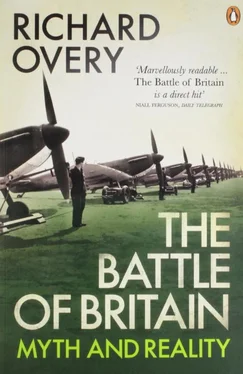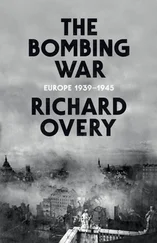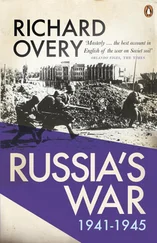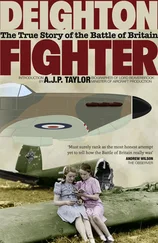Richard Overy
THE BATTLE OF BRITAIN
Myth and Reality
I would like to acknowledge the helpful assistance received in the Imperial War Museum, the Public Record Office, and above all in the Ministry of Defence, Air Historical Branch. I am particularly grateful to Sebastian Ritchie for casting an expert eye over the text at very short notice. I would like to thank Tony Mansell for sorting out figures on casualties, and Richard Simpson of the RAF Museum, Hendon, for help on some technical issues. Simon Winder at Penguin was the inspiration behind the subject and its format. Kate Parker has been a scrupulous editor. Any errors and misjudgements that remain are, as ever, my own responsibility. To Kim, Alexandra and Clementine my love and thanks.
For sixty years ‘The Battle’ has meant one thing to the British people: the Battle of Britain. The contest between the British and German air forces in the late summer and autumn of 1940 has become a defining moment in our recent history, as Trafalgar was for the Victorians. British forces fought other great battles in the twentieth century – the Somme, Passchendaele, Normandy – but only El Alamein exudes the same sweet scent of complete victory, and Egypt was not the Motherland.
In reality neither El Alamein nor the Battle of Britain was a clear-cut battle with a neat conclusion. This has not stopped historians from imposing clarity, nor has it dulled the popular perception that these were glittering milestones along the road to British military success. Both battles were really defensive triumphs: the one saved Egypt and prevented the collapse of Britain’s global war effort, the other saved Britain from cheap conquest. It is avoiding defeat that we have applauded; victory came long afterwards, with more powerful allies in harness.
‘The Battle’ matters because it prevented German invasion and conquest and kept Britain in the war. This achievement was worthwhile enough. Nine European states (ten, counting Danzig) had failed to prevent German occupation by the summer of 1940, with the grimmest of consequences. Nevertheless, some historians have raised serious doubts about the traditional story of the battle, which gave birth to the myth of a united nation repelling invasion, and gave iconographic status to the Spitfires and the ‘few’ who flew them. There is another history to be discovered behind the popular narrative. The effort to uncover it has already challenged some of the most cherished illusions of the battle story.
Take, for example, the generally accepted view that the battle prevented German invasion of southern Britain. Documents on the German side have been used to suggest that this was not so. Invasion, it can be argued, was a bluff designed to force Britain to beg for peace; in the summer of 1940 Hitler’s eyes were already gazing eastwards, where there lay real ‘living-space’. The Royal Air Force did not repel invasion for the apparently simple reason that the Germans were never coming. This interpretation has prompted some historians to suggest that Britain should have taken the chance of peace with Hitler and let the two totalitarian states bleed each other to death in eastern Europe.
Behind this argument lies still more revision. The picture of a firmly united and determined people standing shoulder to shoulder against fascism has been slowly eroded by the weight of historical evidence. The British were less united in 1940 than was once universally believed. Defeatism could be found, side by side with heroic defiance. Churchill’s government, so it is argued, had powerful voices urging a search for peace in the summer of 1940, just like the appeasers of the 1930s. Churchill himself has not been free of reassessment. He has become the butt of wide criticism for his conduct of the war and his style of leadership. Even his inspirational speeches, which have shaped our memory of that summer of 1940, can now be shown to have had a mixed reception among a public desperate for hard news.
It is the purpose of this short book to assess where ‘The Battle’ now stands in history. There is little point in pretending that the historical narrative of the battle is the same as the popular myth. But it is not necessarily the case that the significance of the battle is diminished by recreating the historical reality, any more than the effects of Churchill’s leadership must be negated by acknowledging that he was human too. For a great many reasons the Battle of Britain, myth and reality, was a necessary battle. The consequences of British abdication in 1940 would have been a calamity not just for the British people but for the world as a whole.
We have reason to believe that Germany will be ruthless and indiscriminate in her endeavour to paralyse and destroy our national effort and morale and unless immediate steps are taken to reduce the intensity of attack it is conceivable that the enemy may achieve her object.
AIR MINISTRY MEMORANDUM, APRIL 1938 1
For most of the 1930s Britain’s politicians and military leaders were haunted by nightmare visions of a massive ‘knock-out blow’ from the air against which there could be little defence save the threat of retaliation. When Neville Chamberlain, Britain’s prime minister from 1937 to 1940, flew back to London from Germany at the height of the Czech crisis in 1938, he looked down at the sprawling suburbs of the capital and imagined bombs crashing down upon the innocent victims below him. This horrible picture inspired him to redouble his efforts for peace. A year later, on 3 September, those efforts were finally undone. Britain declared war on Germany for her refusal to withdraw invasion forces from Poland, whose sovereignty Chamberlain had guaranteed five months before.
Almost immediately after Chamberlain broadcast the news from 10 Downing Street that Britain was at war, the sirens sounded. No one had told Chamberlain about the possibility of an air raid and he was ‘visibly shaken’ by it. It was a false alarm. A second one sounded at 3 a.m. that night, getting all London out of bed. For days people waited for the blow from the air which they had been told to expect. Government observers reported that 70 per cent of Londoners carried their gas masks with them. 2The blow never came. The German Air Force had no plans to bomb London in 1939. Like the Royal Air Force (RAF), it was under strict instructions not to start the bombing war or to run the risk of killing civilians from the air. By the end of March only 1 per cent of Londoners could be seen carrying gas masks.
The war the British waged in 1939 was very different from the one they had expected to fight. Chamberlain’s government poured millions of pounds into air power between 1937 and 1939 in order to provide a defensive shield against the knock-out blow, a defence made possible thanks to the fast monoplane fighter and the invention of radar. Millions more went into the expansion of Bomber Command as a deterrent against air attack. Plans were drawn up to bomb the enemy if he would not be deterred. The civilian population was drilled in air-raid precautions so as to reduce the colossal casualties predicted from all-out air war. Much of the top-level thinking on future war presupposed that something like the Battle of Britain might well occur in its very early stages, perhaps without a declaration of war at all.
In Germany the air force took a less extravagant view of air power. There the emphasis lay on combined operations with the army in order to impose a decisive defeat on enemy armed forces. This was and always had been a central principle of German war-making. German air leaders certainly possessed by 1939 the technical means to create an operationally independent air force for long-range attacks on industrial sectors or civilian morale.
Читать дальше












